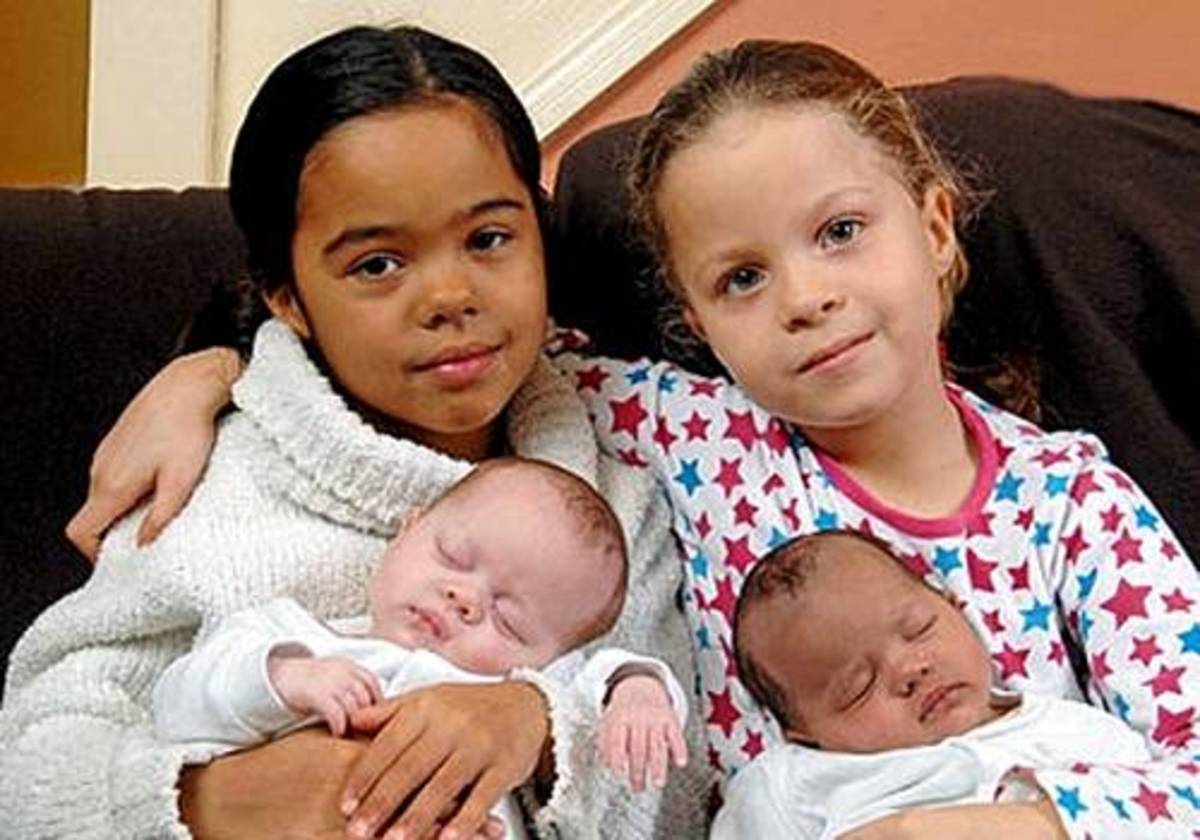Guang Guo: Twin Studies and What they Tell Us about Nature Versus Nurture
In the article entitled “Twin studies: what can they tell us about nature and nurture?” by Guang Guo, information is presented as to the use of both identical and fraternal twins in mapping their genetic structures to determine the propensity for the expression of genetic traits based upon environment.
Guang Guo begins with a sensational example of two successful sets of identical twins and their identically successful (and identical, overall) career paths. In doing so, Guo is exploring the theory that identical twins have the genetic ability and propensity for having the same traits expressed during their lives which would contribute to similar thinking and lifestyles. Twins make for such fascinating and important study, Guo cites, because each set of twins is, on the genetic level, one hundred percent identical. And thus, the ultimate reason and question for this article is raised: if a set of twins share both genes and environment, how much do genes and that environment then contribute to the twins and their personalities—further, with the knowledge that genetic traits are expressed based upon environment, which then, is more important, nature or nurture? To give even more credence to the study, Guo’s research focuses on the genetic differences between identical and fraternal twins. As, with both sets of twins, the environment would be essentially the same and the main differences would come down to the genetic level. If, for example, identical twins develop complex traits (like reading ability) more often than their fraternal counterparts, then genetic trait development has more to do with studying twin personalities than nurture. However, the article, at this point, transfers into a defensive reasoning argument to conclude that the study of identical twins has contributed as an exploratory tool for molecular genetic studies and there is no definite conclusion for the nature versus nurture argument.
The Largest Problem
The largest problem with genetic trait studies in using both identical and fraternal twins as the fundamental for comparison is that “if being treated identically, in dressing for instance, makes identical twins more similar than fraternal twins, we could mistakenly attribute effects to genes that are really due to differences in treatment” (Guo, 2005, p. 44). From this inference, while the information gained from studying both identical and fraternal twins might be the key for the future of molecular genetics, there is a fatal flaw in the study itself.
In studying the genetic traits of both identical and fraternal twins, the nature versus nurture argument essentially becomes a moot point. Whatever can be said about the genetic propensity for traits expression based upon environment, the truth is that identical twins, and even fraternal twins, come from a similar enough environment that the same genetic traits should be expressed without interruption. If, however, one twin has schizophrenia and the other has also “[inherited] a predisposition to this disorder” (Keltner, James, Darling, Findley, Oliver, 2001, para. 13), as a twin has a one in two chance of having the same disorder (Guo), then it should stand to reason that the second twin does not only have a predisposition for the disorder but they should, based upon an identical environment, have the trait expressed genetically as well, and without fault. Further, “social scientists have also recognized…that the calculation of heritabilities for traits and the partitioning of variance into genetic and environmental components—the traditional domain of behavioral genetics—is of limited value” (Coll, Bearer, Lerner, 2004, p. 54). Indeed, where Guo is concerned, genetic traits are expressed based upon the environment in which they are achieved.
The Research is Inconclusive
Guang Guo's research is lacking in the discoveries presented in that it fails to answer the very question which he set out to achieve: what can twin studies conclude about nature versus nurture. In this, Guo may have started off with brilliant genetic examples, but he ended with a defensive argument about why twin studies are important to molecular genetic studies. Indeed, much can be said about the research founding genetic trait expression, but the article gives a bit too much weight to traits that seem to have nothing to do with genetic expression whatsoever: like the propensity for drinking if one’s friends are drinking.
Or, the fact that African-American children with parents who are unemployed have less cognitive abilities later in life than their white, children of employed parents counterparts. The argument, in this sense should have been that all children have a delayed cognitive ability if raised in a non-conducive environment and avoided the issue of race altogether. In the end, while the article presents a few enticing ideas about the study of both identical and fraternal twins, the research fails to answer what it set out to achieve.
What Makes Each Twin Different?
Before I even read the article I was fascinated about the genetic differences in twins. I have always wondered how, if two people are genetically and literally identical (at least to the medical point of view) how they could differ emotionally and in their beliefs. Sure, some twins are virtually the same people, but that’s a rare event. For the most part, twins are two separate identities, the only difference being that they are physically and bodily identical.
I also wondered, if, since most twins are raised in the same environment, what it is then that makes the mind different in each—because if it comes down to nature or nurture, and they are raised in the same environment, how could one then grow to be different from the other? Surely the parents never set out to pamper one over the other, or make light of the others accomplishments, so, if both twins are reared in the same environment, with the same values, and they are identical bodily, how, then, can the mind have different values, wants, and needs?
And what it is, exactly, that marks the defining moments in a person’s personality. How would this be different in twins—and further, why would it be different at all? Wouldn’t two people, raised at the same time, born of the same physical attributes then develop into the same personality? Obviously the answer here is no, but of course, even science wants to know and understand why.
Even more, but I don’t think the article will cover this, how would genetics and the nature nurture argument differ when applied to multiple births?
I suppose it is simply that, even though a person might have an identical twin, they are still a unique person, and can thusly develop emotionally and in their beliefs separate from any siblings. I suppose, this all shall be answered.
Famous Twins
The article starts off by talking about famous twins, Ann Landers and her sister Dear Abby and Harold and Bernard Shapiro, heads of major universities. Both sets shared the same essential professional life, which is interesting, and both sets were powerful in their professional career paths. Apparently, Dear Abby and Ann Landers once had personal conflicts, but even in that, they agreed upon all advice proffered to their respective readership.
Good quote: “each pair shares essentially 100 percent of their genes. And having been raised together, these identical twins also shared the same family environment” (Guo, 2005, p. 43).
Then the ultimate question and reason for this article is raised: how much do the genes and environment contribute to the twins’ personalities, if they share the same genes and environment? And, more importantly, knowing that they do indeed make some difference, how and why do they make a difference?
Traditional Twin Studies
The nature versus nurture argument is so polarizing a debate that there are television shows that utilize it as a theme. From fantasy shows: if a demon is born a demon, will it then become one if raised in a safe, “good” environment?
Or even from real life, if a child is born from a serial killer, will he or she then become a serial killer or be a normal and productive member of society, if raised in a good and sound environment? In this case, could environment really even make a difference? Or does nature have more to say than people think?
The article brings up an interesting point: finding twins separated at birth would indeed make the ideal test case. But, of course, that would be exceedingly rare as, unless both (or one) were given up for adoption, and were found for such a study, their existence would not even be known for a scientist to find and study.
So, that notwithstanding, scientists have done the most research in comparing fraternal twins to identical twins. They reason that identical twins are, essentially, clones, but fraternal twins are like two separate people and thus the study, in this case, makes sense. It is like studying two siblings, who happen to have half their genes in common.
Good quote: “comparing identical and fraternal twins enables researchers to separate genetic from environmental influences without measuring genes directly. If a physical or behavioral trait, like hair color or success at math, is shared more often by identical twins than by fraternal twins, researchers reason, genes must have played a role in developing the trait” (Guo, 2005, p. 43).
This, I suppose does make sense. In using fraternal twins, researchers do essentially have a set of twins to work with. Fraternal twins have the same environment and are raised at the same time, and thus it would stand to reason that they too would grow to be the same personalities, unless, of course, genes have more to do with development than environment.
Of course, while the two twin studies offered at the beginning of the article might be fascinating information, they don’t relate much about genes or nature versus nurture.
Good quote: “career similarity between twins could be a result of coincidence, genetic likeness, similar family influences, or a combination of these factors” (Guo, 2005, p. 43).
What might be interesting! What if two twins were separated at birth and did, despite two completely different environments, grow and develop to have the same career and, even, success in that professional career. That would prove that genes had more to do with development of the personality than the environment.
The numbers involved in the odds of getting one genetic disposition (like schizophrenia) are discussed. If one twin has it, the other is twice as likely (or has a one in two chance) of developing it as well. Same goes for other genetic ingredients, like height, weight, and reading skills. Much more too.
Problems with Traditional Twin Studies
One of the big problems with this type of study is the interference of the environment. Do identical twins have a closer treatment from their parents than their fraternal counterparts? Most likely, their parents dress them alike more often.
Good quote: “if being treated identically, in dressing for instance, makes identical twins more similar than fraternal twins, we could mistakenly attribute effects to genes that are really due to differences in treatment” (Guo, 2005, p. 44).
What’s interesting, here, is that they even choose to study the comparison between identical twins and fraternal twins at all. It seems to me that they should be two separate studies, as they are virtually so different.
Scientists should study the effects of genes and environment on identical twins, and make a separate study of genes and environment on fraternal twins. I think the comparisons leave too much room for error, because surely identical and fraternal twins would not be treated the same way growing up. The very foundation of a fraternal twin is that they are, really, a different person from their twin.
But, identical twins are always seen dressed the same, from birth. They, from their moment of arriving on this planet, are treated as the same person, and it isn’t until they start asserting their personalities (the will to dress differently) that parents begin to separate them into two different beings.
The article goes on to suggest other problems with the study, other factors that might make wrong attributes, but I think they skipped the main one: that identical twins and fraternal twins are not alike enough to even make such a comparison study.
Using Twins to Study Gene-by-Environment Interactions
Studies show that genes react to the environment in which they are placed. It would stand to reason, then, that twins with the same genes in two different environments would result in two different expressions of genes.
Good quote: “African-American children and children whose parents are unemployed are less likely to realize their genetic potential for cognitive development than white children and children of employed parents, respectively” (Guo, 2005, p. 47).
Now, this bothers me. Again, they are studying two separate things and calling it all the same. I don’t believe that African-American children can be compared to white children in such a manner, as it relates more as a matter for race studies than genetic development. There is, or at least we are taught to believe, that all people, despite their color have the same potential developmentally.
If cognitive development comes down to a matter of employed or unemployed parents, than, indeed, there is much to say about nature versus nurture. Or, if African-Americans are less likely to develop cognitively than white people.
Surely, a white person stands to have the same lack in cognitive development as an African-American if raised with unemployed parents in a less than satisfactory environment. The same goes for employed parents and high-status environments. It comes down to environment and parenting, not race.
It notes too, that if a person has friends who drink, they are more likely to drink. I think this is useless too. A person is not more likely, genetically, to drink if their friends are drinking, it just shows that they are more likely to give in to the peer pressure of drinking. Now, if they become an alcoholic because they had alcoholic parents, that would make perfect sense for this argument.
I don’t think a person is even more likely to drink if their siblings are drinking. It is a choice that must be made, on a personal and not genetic level that dictates this.
Finally, they decide that if one twin develops a genetic disorder, like schizophrenia, the other might too. This makes sense as they do share the same genes.
References
Coll, C.G., Bearer, E.L., & Lerner, R. M. (Eds.). (2004). Nature and nurture: the complex interplay of genetic and environmental influences on human behavior and development. Mahwah, NJ: Lawrence Erlbaum Associates.
Guo, G. (2005). Twin studies: what can they tell us about nature and nurture? Contexts, 4(3), 43-47.
Keltner, N.L., James, C.A., Darling, R.J., Findley, L.S., & Oliver, K. (2001). Nature vs. nurture: two brothers with schizophrenia. Perspectives in Psychiatric Care, 37(3), 88.









